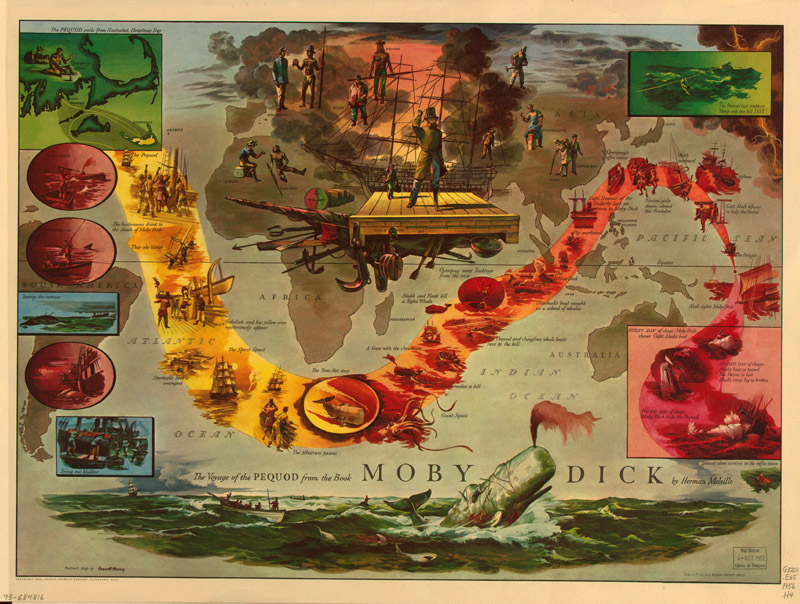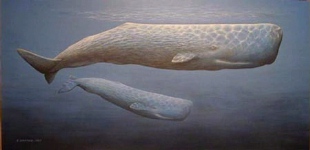Selections: Melville on The Whale, Part 1, pages 1-79
Taken from Penguin Books, 1992; 625 pages. Key Conceptual Metaphors: MAN IS LEVIATHON; THE WORLD THE WHALE
In this series you will discover, through understanding world and self in terms of the unspoiled surface of the deep and its great Leviathan, that genuine morality requires unconscious, non-responsible action, and that also conscious will – at least as conceived according to pseudo-philosophical lore – is largely an illusion, and further still, that the Sperm Whale likely has two separate spheres of visual consciousness, in contrast to the result of the two mutually reinforcing visual portals of the human mind. As if this was not quite enough, there is much more to be gleaned from Melville’s narrative on The Whale, which happens to be the greatest novel produced within our envied American boarders.
I provide only brief selections, in the order they appear in the extant text, marked by interpretive headings and indexed by the number of the page from which they are taken, and in a way that will not spoil the plot for those yet to embark on this historical journey.
_____________
Opening line (a note on precision):
Call me Ishmael. Some years ago – never mind how long precisely – having little to no money in my purse, and nothing particular to interest me on shore, I thought I would sail about a little and see the watery part of the world (3).
On the Illusion of Conscious Will (already quoted here):
Now that I recall all the circumstances, I think I can see a little into the springs and motives which being cunningly presented to me under various disguises, induced me to set about performing the part I did, besides cajoling me into the delusion that it was a choice resulting from my own unbiased freewill and discriminating judgment (7).
Some demotic, old-fashioned literary craft:
. . . while in the deep shadows of his eyes floated some reminiscences that did not seem to give him much joy (17).
Breaking the spell, 1 (preliminary fearful fixation on the savage):
. . . I thought it was high time, now or never, before the light was put out, to break the spell in which I has so long been bound (25).
Breaking the conscious spell, 2:
What’s all this fuss I have been making about, thought I to myself – the man’s a human being just as I am: he has just as much reason to fear me, as I have to be afraid of him. Better sleep with a sober cannibal than a drunken Christian (26).
Breaking the unconscious spell, 3:
For what seemed ages piled on ages, I lay there, frozen with the most awful fears, not daring to drag away my hand; yet ever thinking that if I could but stir it one single inch, the horrible spell would be broken (29).
Analyzing the half-civilized cannibal:
But Queequeg, do you see, was a creature in the transition state – neither caterpillar nor butterfly (31).
Faith:
But faith, like a jackal, feeds among the tombs, and even from these dead doubts she gathers her most vital hope (42).
Soul & Body:
Methinks that what they call my shadow here on earth is my true substance. Methinks that in looking at things spiritual, we are too much like oysters observing the sun through the water, and thinking that thick water the thinnest of air. Methinks my body is but the lees of my better being. In fact take my body who will, take it I say, it is not me. And therefore three cheers for Nantucket; and come a stove boat and stove body when they will, for stave my soul, Jove himself cannot (42).
Obeying God (from the sermon) [making a good man bad -MPM]:
But all the things that God would have us do are hard for us to do – remember that – and hence, he oftener commands us than endeavors to persuade. And if we obey God, we must disobey ourselves; and it is in this disobeying ourselves, wherein the hardness of obeying God consists (48).
Situation of moral and legal censure (from the sermon):
Now Jonah’s Captain, shipmates, was one whose discernment detects crime in any, but whose cupidity exposes it only in the penniless (49).
The strong humility of Dear Leaders (from the sermon):
But again he leaned over towards the people, and bowing his head lowly, with an aspect of the deepest yet manliest humility . . . “I am a greater sinner than ye. And how gladly would I come down from this mast-head and sit on the hatches there where you sit, and listen as you listen, while some one of you reads me that other and more awful lesson which Jonah teaches to me, as a pilot of the living God. How being an anointed pilot-prophet, or speaker of true things, and bidden by the Lord to sound those unwelcome truths in the ears of a wicked Nineveh, Jonah, appalled at the hostility he should raise, fled from his mission, and sought to escape his duty and his God by taking ship at Joppa. But God is everywhere . . . God came upon him in the whale, and swallowed him down to living gulfs of doom. . . and all the watery world of woe bowled over him. . . . the whale . . . vomited out Jonah . . . Woe to him who seeks to pleasure rather than to appall! . . . Woe to him who, in this world, courts not dishonor! . . . Yea, woe to him who, as the great Pilot Paul has it, while preaching to others is himself a castaway! . . . Delight is to him [4 times repeated -MPM] who acknowledge no law or lord, but the Lord his God, and is only a patriot to heaven” (53-54).
The Heathen, Consciousness, & True Philosophy:
. . . having left the Chapel before the benediction some time . . . humming to himself in his heathenish way . . . I saw the traces of a simple honest heart . . . a certain lofty bearing about the Pagan . . . But savages are strange beings . . . at first they are overawing; their calm self-collectedness of simplicity seems a Socratic Wisdom . . . content with his own companionship; always equal to himself. Surely this was a touch of fine philosophy . . . perhaps to become true philosophers, we mortals should not be conscious of so living or so striving. So soon as I hear that such or such a man gives himself out for a philosopher, I conclude that, like the dyspeptic old woman, he must have ‘broken his digester” (56).
Embracing the World & The Splintered Heart:
I felt a melting in me. No more my splintered heart and maddened hand were turned against the wolfish world. This soothing savage had redeemed it. There he sat, his very indifference speaking a nature in which there lurked no civilized hypocrisies and bland deceits. Wild he was; a very sight of sights to see; yet I began to feel myself mysteriously drawn towards him. And those same things that would have repelled most others, they were the very magnets that thus drew me. I’ll try a pagan friend, thought I, since Christian kindness has proved but hollow courtesy . . . he pressed his forehead against mine, clasped me round the waist, and said that henceforth we were married; meaning, in his country’s phrase, that we were bosom friends; he would gladly die for me, if need should be (57).
Idol Worship and a religious reductio:
I was a good Christian; born and bred in the bosom of the infallible Presbyterian Church. How then could I unite with this wild idolater in worshipping his piece of wood? But what is worship? thought I. Do you suppose now, Ishmael, that the magnanimous God of heaven and earth – pagans and all included – can possibly be jealous of an insignificant bit of black wood? Impossible! But what is worship? – to do the will of God – that is worship. And what is the will of God? – to do to my fellow man what I would have my fellow man do to me – that is the will of God. Now, Queequeg is my fellow man. And what do I wish that this Queequeg would do to me? . . . ergo, I must turn idolater. . . we undressed and went to bed, at peace with our own consciences and all the world.
Ishmael dusts his feet; a foretaste of Captain Nemo:
. . . how I spurned that turnpike earth! – that common highway all over dented with the marks of slavish heels and hoofs; and turned me to admire the magnanimity of the sea which will permit no records (66).
Genuine Morality requires non-Responsible, unconscious action:
The poor fellow . . . was swept overboard; all hands were in a panic . . . Queequeg stripped to the waist, darted from the side with a long living arc of a leap. For three minutes or more he was seen swimming like a dog . . . through freezing foam. I looked at the grand and glorious fellow, but saw no one to be saved. The greenhorn had gone down. Shooting himself perpendicularly from the water, Queequeg now took an instant’s glance around him, and seeming to see just how matters were, dived down and disappeared. A few minutes more, and he rose again, one arm sill striking out, and with the other dragging a lifeless form. . . . From that hour I clove to Queequeg like a barnacle; yea, till poor Queequeg took his last long dive. Was there ever such unconsciousenss? He did not seem to think that he at all deserved a medal from the Humane and Magnanimous Societies. He only asked for water – fresh water – something to wipe the brine off; that done, he put on dry clothes, lighted his pipe, and leaning against the bulwarks, and mildly eyeing those around him, seemed to be saying to himself – “It’s a mutual, jointstock world, in all meridians. We cannibals must help these Christians” (68).
The Hermits of the Sea, untouched by even the wrath of God:
And thus have these naked Nantuckerters, these sea hermits, issuing from their ant-hill in the sea, overrun and conquered the watery world like so many Alexanders . . . The Nantucketer, he alone resides and rests on the sea; he alone, in Bible language, goes down to it in ships; to and fro ploughing it as his own special plantation. There is his home; there lies his business, which a Noah’s flood would not interrupt, though it overwhelmed all the millions in China . . . With the landless gull, that at sunset folds her wings and is rocked to sleep between billows; so at nightfall, the Nantucketer, out of sight of land, furls his sails, and lays him to his rest, while under his very pillow rush herds of walruses and whales (70-71).
The Pequod:
She was a thing of trophies. A cannibal of a craft, tricking herself forth in the chased bones of her enemies . . . A noble craft, but somehow a most melancholy! All noble things are touched with that (78).
Implicit Bias:
I saw that under the mask of these half humorous inuendoes, this old seaman, as an insulated Quakerish Nantucketer, was full of his insular prejudices, and rather distrustful of all aliens, unless they hailed from Cape Cod or the Vineyard (79).




